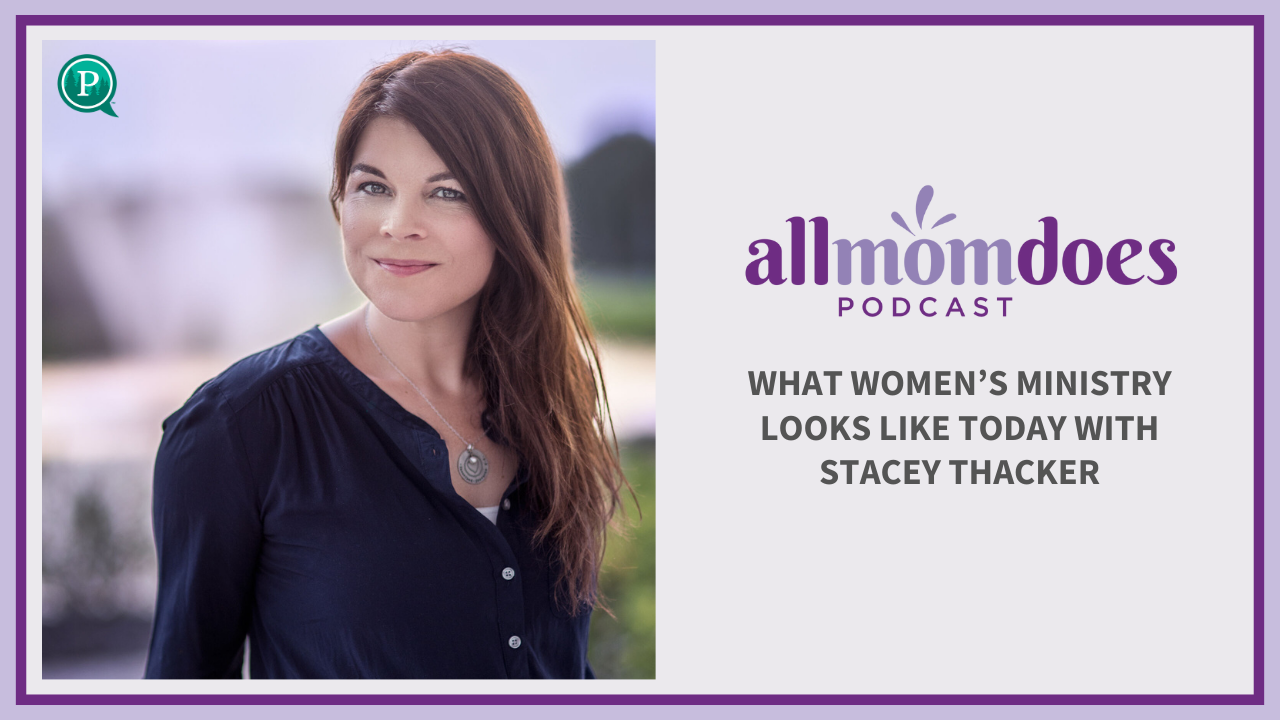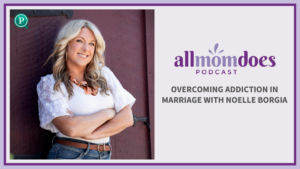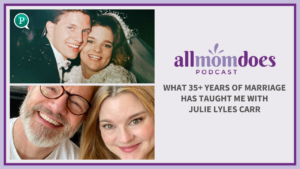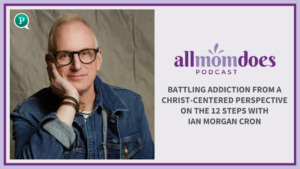Stacey Thacker and Julie Lyles Carr have some things in common, including that they have both served as women’s ministry leaders. Find out what women’s ministry looks like today, the challenges and trends women are dealing with, and how we can serve each other well on The AllMomDoes Podcast.
Special thanks to Seattle’s Union Gospel Mission, for powering the AllMomDoes Podcast this Christmas season!
Show Notes:
Find Stacey: Online | Instagram | Facebook | X
Find Julie: Online | Instagram | Facebook | X | Pinterest
AllMomDoes | Instagram | Facebook | X
Transcription:
Purposely, your life, God’s purpose. [email protected].
Julie Lyles Carr:
Every now and then you get to have a very serendipitous meeting, and that’s what happened to me recently. I was in the Nashville Airport and I heard this little voice calling out saying, “Julie, is that you?” A friend of mine who I’d actually only known online, her name is Angie Brown, and you have heard her before on the podcast. She came running over. Now why was she in Tennessee when I know she lives in Florida? Why was she at the airport? We unpacked all that, but she had someone with her who I got to meet and now you are going to get to meet that person too. I’m Julie Lyles Carr, this is the AllMomDoes podcast. As a result of that meeting at the Nashville Airport, I got to meet my new friend, Stacey Thacker. Stacey, it is so great to have you on the show.
Stacey Thacker:
Well, thank you Julie. That was such a fun meeting at the airport. I remember that, it was so good to see you.
Julie Lyles Carr:
It was just so fun. Angie, of course is just this amazing light. I’ll have Rebecca link in the show notes the episode that we had with Angie. You guys both live in the Orlando, Florida area and you both serve in different ways at your home church there. So you were with Angie on this particular trip to Nashville and we all got to meet and then you and I discovered that we had connections because we both have books with the same publisher. It was just like, wait a minute, the world just got a little cozier that day. So I really appreciate you being willing to come on because you have a fascinating life. You have some really fascinating insights into women and their spiritual journeys. So I’m so excited you’re here. Tell the listener, I’ve already told you you live in Orlando. Give them some more details on your life, Stacey.
Stacey Thacker:
I do. I do. Real people do live in Orlando. It’s not just the vacation capital of the world, although we love when you come. So yeah, I’m actually born and bred. I grew up in Indiana, so I’m a Midwestern girl, I grew up in Indiana. My husband and I moved down to Florida about 21 years ago, so I guess that probably makes me more of a Floridian than a Midwestern girl, but it’s in my bones. So we moved down here 21 years ago. I was pregnant with my second daughter, so I have actually four girls. We’re one of a kind family outside of dad and the dog. So my second daughter, I was pregnant with her when we moved down here for my husband, he worked for Campus Crusade for Christ at the time. So we came down. I knew nobody. We jumped into this big beautiful, lovely community called Orlandos in central Florida, and I’m a fan now. I love sunshine every day. I love the people, I love the energy.
More than anything, I do love my church. We’ve been part of the same church since we moved down here. I just love getting to walk with Jesus in a great community of other believers. So for us, we really ended up staying, even though jobs changed and lives changed because we just had found a home here, and so we love being here.
Angie is one of my in real life friends. I’m perpetually jealous of her hair. If you don’t know Angie.
Julie Lyles Carr:
Oh, the hair. Yeah, the hair is amazing.
Stacey Thacker:
She’s not only one of the most amazing, generous, bubbly people, but she also has this amazing red hair. So when I’m out with Angie in the airport and people stop us, they generally are going to tell us how amazing her hair is. So it’s just one of those conversations I’m used to, but Angie’s my great friend, we do ministry together. In fact, we just did an event a couple of weeks ago and she was the producer of the event and my position got to lead out on the event. So it’s just such a special thing to get to do ministry with your friend. So I love that we have that connection of her. I am a huge Angie Elkins fan to the core.
Julie Lyles Carr:
Yeah, yeah, she is amazing, so I just love her to pieces. Well, Stacey, part of what you and I discovered in addition to having people in common and in both being authors and all this different stuff, is that I spent a long tenure at my local church working as the women’s ministry lead, and you have now just taken on that role at the church where you are. It leads to a conversation that I think is really interesting to take a bead on where each of us may feel like women’s ministry is today and where things are headed.
For me, when I began in that role several years ago, there were things that I assumed that women would need and ways that I could come along and support. Over time, Stacey, I’ve got to tell you, things kept shifting a little bit. The things that I assumed were going to work or would be needs weren’t necessarily the things that resonated. Then things that I would’ve never seen coming were things that really caught gear and seemed to be of great help or things that people needed. Since I’ve exited that role and still hopefully in being able to minister to women in a different way, but just not on at my local church, you have now taken on this role at the place where you have been a congregant for a long time and you are now leading that ministry. What are some of the things in these early days of this position for you that you’re noticing that surprise you? What are some things that you didn’t quite expect when you took on this role?
Stacey Thacker:
That’s a great observation. So now I want to ask you a million questions since you’ve actually done what I’m doing now. Let me preface this with saying, is that I’ve done ministry… Again, we’ve been in this church for 21 years and my new position as the Director of Women’s Ministry at… And I will say my church is large, it would be considered a mega church and we easily have over 5,000 people here on campus every weekend. So this is an unusual ministry situation to be sure. Because I knew so many people and I’ve been involved, I’ve spoken at my church, I’ve led bible studies at my church, I’ve discipled at my church, my kids have all grown up here. So I come in, I don’t know, maybe a little bit differently because I had a lot of relational equity already because I knew a lot of people. However, it is also interesting to be a church member and then suddenly on staff and to be a leader. In fact, my girls were just asking me yesterday, “Hey mom, do you miss just going to church? Do you miss that?” I said there are times that I do, you miss that anonymity so to speak, but what I gain from a leadership perspective and also my staff, my fellow staff members and my team, is it more than makes up with the anonymity I might’ve felt before I became actually on staff.
But let me say this, one of the quick things that I’ve learned, Julie, is that ministry in theory is different than ministry in reality. So I, now let me say this, I love online ministry. I have done it for years. It’s really where the birth of my ministry in my mothering years when I was knee-deep in babies and kids and I started writing, gosh, it’s been 14 years ago. I love social media. I know there’s evils obviously, but I think it’s a great way to reach people for Jesus. I just love it. I can sit and I can write and I have real life to pull from because you have to live your life in order to write, but at the same time, what I’m encountering right now in women’s ministry, in reality, it’s very different than in my head what I thought it was going to be. So, totally agree with that.
I think one of the things, and I’m wondering too for you, did you minister through the pandemic? Were you through 2020 were you doing women’s ministry? Because I think there’s been some shifts somewhat because of all that we went through during that season. Me starting this year in ’23, so we’re really a good year out. I think if we count the pandemic from ’20 to 22-ish.
Julie Lyles Carr:
’22-ish, yeah, yeah.
Stacey Thacker:
I’m really a year out. So I feel like there’s been some shifts. So I’m wondering, were you leading in women’s ministry during that time when everything shifted?
Julie Lyles Carr:
I was until early fall of 2020, and so I made that shift to the online space. We had already been doing some things online, but that’s when that really necessitated going full bore with that.
I tell you what I saw, Stacey, that was very interesting that I wasn’t around long enough to really see the resolution of it, but I saw it brewing, was there were a lot of topics that it was almost like when we were all still in person and pre-pandemic, there were topics that were there and were floating around, but we didn’t have to get into the nitty-gritty of it. We could all just coexist on some certain things. I’m talking about some hot button topics, everything from politics to different opinions on how things should be run and on and on and on. To me, what began to happen, not just within my own experience but in watching some others, was some of those conversations all of a sudden just came forced to the surface. Things that people had not necessarily seen as lines of distinction between each other all of a sudden became very obvious.
Part of what was interesting I think to watch, in our case, because we have a child who has cerebral palsy. We were very locked down as a family. We were being advised by her doctors and all of those people that we had to be very, very careful with her. We got, not necessarily from my home church, but we were getting criticism from some people. Then I would go online and I would see people who were making fun of people who were having to be in the same level of quarantine that we were. Then I would see other people who would jump on and attack those people. All of these people supposedly belong to Jesus and everybody is just those kinds of things, which then led to further disclosures of opinions and politics and on and on and on. It was just wild to me in the online space.
I’m curious to hear how you feel like people have recovered, in a sense, from having to expose the places where there wasn’t unity, where there was disagreement. Things that maybe if we’d still been sitting shoulder to shoulder, we would not have said out loud to each other, but in the online space people started shouting it. So that’s what I don’t know moving forward. How has some of that resolved or has there been a little bit more of a sense now in some of our faith spaces where you feel like you have to be a little more in agreement in order to be buddies in that space? What are you seeing?
Stacey Thacker:
Yeah, oh gosh. Well, I think what happened, and one of the things that I think was so explosive during that time was is that the church is meant to be a body together, where it’s meant to be shoulder to shoulder. So I think some of that stuff came up because maybe we lost a little bit of that community. So I think we maybe got a little braver to say things or I think it was just, it attacks deliberately our communal aspect. So I think when we first came back, we were finding we were maybe walking more on eggshells and not trying to figure out, okay, we all, why are we here?
So what we have found here in our church community is the more we lift up Jesus, the more we focus on him. All of that other stuff settles more. We can say, okay, we don’t have to, unity doesn’t mean we are uniform. It doesn’t mean we’re going to agree on all those issues, but here’s what we can’t agree on. So I found in our community here, the more we talk about the gospel, the more we talk about our mission, the more we reach out beyond our walls, the more we invite people in and we focus on the truth of scripture, that those things settle a little bit more and we can say, okay, we can agree to disagree on those, but here’s the stuff we’re going to focus on.
What I see with women, and more particularly to what I’m seeing in the past few months is that women are hungry and they are desperate for that community that I think we lost for so long. They’re desperate to be encouraged. I think we all are coming. I think we’ve all faced our own brokenness and our own lack, and we’ve just been reminded how much we need each other. So even just what I’ve seen is just this spark recently just of women just hungry for the Lord, just want to be in a room together and singing together and being encouraging one another.
I mean, I’ve seen people recently that I haven’t seen for five years that are coming back, that are coming back to church that are saying, “Hey, I realize how much I need this now.” So that is exciting to me. We’re seeing exponential growth here, which we hadn’t seen for a long time and I really do think that people are just hungry for the Lord. So we don’t know, I mean, we don’t know how long it’s going to last. We don’t know how long people are going to be saying, “Hey, I want to know more.” So we’re doing everything we can to connect with them and encourage them and share Jesus with them.
Really from, as we’ve come out of it, my goal here is I really want to create safe places for women. I think safety in women is a big deal. So creating safe places where they can come in and they can learn about God, but they can also be known. I think those are the two things as I’m bringing people in, are what I’m focusing on as a leader. How do I make this a space where women feel welcome and they can learn who God is, but also they can get to know someone who’s sitting beside them too in a very safe environment? So those are, I don’t know, off the top what my… As I’ve started in this leadership position, what I’ve been aiming for.
Julie Lyles Carr:
Stacey, that’s a really important thing to note when it comes to being part of women’s ministry. Whether you’re someone who’s attending a church and you’re in, your attending classes, you’re going to events that kind of thing, or you’re someone leading in those spaces. It was something regardless of the pandemic that I was trying to really hit on a few years ago, because yes, there are those cultural issues that we know can be controversial. We are encouraging Christians to speak up, all those kinds of things. However, when we get really on our soapbox about certain things, you never know what’s going on in someone’s life, what their experience has been, and how you can unintentionally be creating barriers for them to feel safe. Now, this is a different conversation than saying embracing someone’s sin or… I’m not talking about that. I’m just saying the notion that we can assume that everybody has lived a prototypical historical Christian life up to the point in which they enter our ministries is extremely naive.
I saw some women get so hurt because someone had some topic that was their passion thing, great, but they weren’t discretionary in how they talked about it. They would sit at a table and make proclamations and then a woman who had history or who had something really hard in her past, all of a sudden no longer feels safe. What are the things you are doing to create an environment that is safe for women, not in which we’re trying to mute the truths of God or encouraging people to live out God’s best, but at the same time not unintentionally obliterating people?
Stacey Thacker:
Gosh, and that’s so hard. It doesn’t matter if you have a big church or a small church. I think first of all, engaging women where they are, inviting them in. I think we try whenever we do an event, is to have a next step, like a next logical step. So if you come and maybe you want to do a small group, like you want to be part of a Bible study, we’re also, we know that women love to serve. So we’ve created some women’s ministry specific serving opportunities where we find that sometimes women open up when they’re doing this, when they’re serving side by side, they might-
Julie Lyles Carr:
The task, yeah.
Stacey Thacker:
The task sometimes. So then the other thing that we’re doing is we’re launching a mentoring program and I’m really excited about that because I feel like it’s going to give women a chance to ask those questions. It’s going to give women a chance to be engaging with one or two other women that maybe are a little farther down the road spiritually. Really what I’m trying to do in my next phase is really to raise up volunteers who have that, I don’t know, I would call it maybe, I’ll coin a term, spiritual intelligence. Like we talk about emotional intelligence and just being aware, is just raising up leaders who are sensitive to the fact that our heart and our mission is to point people to Jesus. We’re here to encourage and we really want to help people take their next step. We’re not trying to fix what’s broken necessarily in their past or answer all their questions, but I do know that the word of God is true and I do know that the word of God brings hope and healing like nothing else in the world.
So if I can introduce someone to Jesus and we can talk about him and we can talk about stories like when he met the woman at the well or when he engaged in our life as a person, I can point people to him. I can trust his work in their life to fix those things. Beyond that even, encourage them to come and be in a small group or counseling, that sort of thing. I think we have to get to the point where we realize we can’t fix everything. That’s not our job. Our job is to bring people in, is to share Christ with them, and help them take their next step.
So when I talk about safe places, it’s really environments where women feel welcome and they feel like they can come in and check things out. That’s one of the things I think I’ve heard a lot of people, Julie, say that women’s events are dead, nobody’s going to women’s events and nobody wants to do that. I’m seeing the opposite. I’m seeing women love coming with other women and they love looking around and kind, figuring out.
One of the things I think is we just did this thing we did a couple weeks ago. We had a meal. I don’t know what it is about food, and I don’t know if it’s a woman thing or not, but you sit down and then you eat food together, it just breaks down those walls. So creating those kinds of things where women don’t feel like they’re on trial, but they can come in and they can just be themselves. Those are some things that I’ve tried and I’m seeing gain some traction as we’re moving forward into our big fall ministry year, so.
Julie Lyles Carr:
With the holidays coming, if you’re like me, you’ve probably got lists upon lists of to-dos and recipes and Christmas card addresses and all the rest, but there might just be something that hasn’t made your list yet and it needs to.
Seattle’s Union Gospel Mission started over 90 years ago serving soup to those who were suffering during the Great Depression. Fast-forward 90 years and today thousands of people are served each year with 360 degree care for the homeless throughout the greater Seattle area. Seattle’s Union Gospel mission is highly relational, meeting urgent physical needs and providing long-term recovery programs with faith and hope. Seattle’s Union Gospel Mission gets to the root causes of homelessness. This Christmas season, put those in need on your Christmas list. Make this Christmas one that makes a difference. Go to ugm.org to learn how you can volunteer or donate, give the gift of help and healing with Seattle’s Union Gospel mission ugm.org.
Right there is something about that shared meal that is really powerful and Jesus knew the magic of that, if you will, he knew that. We still see it be so effective today, when you can have an opportunity to sit down and just family dinner kind of a thing.
Stacey, one thing that I found difficult to navigate and hopefully made some strides, but was managing the expectation of women coming to different things that we offered, in that I knew the caliber of leadership team I had, I knew the caliber of women I had who were strategically placed at tables to help engage conversation, that kind of thing. Yet we do have people come to us who are wounded, who are lonely, and in some ways they’re looking for this to not work, if that makes sense?
Stacey Thacker:
Mm-hmm.
Julie Lyles Carr:
So I can remember times where we would’ve really rolled out the red carpet, would’ve done everything we could have done, and there would be a woman or two who would say, “Well, nobody’s talking to me and nobody’s doing this and nobody’s doing that.” It was tricky to try to engage and say, “Hey, we can build what we can build. We can set the table as best we can,” but there is a level of responsibility for people coming to things. I think part of it is a lot of us who are in ministry now saw some of the secret friendly models and took on a whole lot of responsibility on ourselves to do everything we could possibly do to make everybody feel included. Yet there is that on-ramp that someone has to be willing to take on in order to enter community. How do you navigate some of those places, where you are wanting to serve and serve well, but you can’t force somebody to reach outside of themselves and extend a hand? How do you handle that?
Stacey Thacker:
All of that resonates so deeply. I think we live in a society where we think we’re going to a fast food restaurant and we can just say, “I want a burger and fries and chocolate shake, and I want it cooked this way and tomorrow.” So when you’re talking about people and their expectations, they can come in very specifically thinking, okay, this is what I’m going to want, and if you don’t meet my need, then I’m out. They give you such a… I mean, how many times are they going to, how many opportunities are they going to give you? I think that is definitely there.
I think from a leadership perspective, you have to go in saying, okay, there’s going to be some people on that extreme that I might never reach, but and there may be some people on the other side who have very low expectations. I don’t know that I’m ever going to get to either one of the extremes, but the people, the majority of people are coming in, they don’t have those high expectations necessarily. But I will tell you this, for me, I have had to step back and not try to jump in and fix that problem.
Let me tell you a story. So my nature would be like, oh, I’m so sorry. What can I get you and what is it going to make a difference? I want to fix that thing that you think is wrong with our very human, personal Jesus led ministry, but we’re not ever going to. You can’t order that a fast food restaurant, right?
Julie Lyles Carr:
Right.
Stacey Thacker:
So I would be so quick to jump in and try to fix the problem for that person. I was in a group not too long ago and had someone come in and they had been wounded and hurt by some things, and it was that attitude like, I’m going to see what you can do for me. But slowly over time, what I saw when I stepped back and I let the bigger community minister to this person, it was unbelievable to watch the layers come off in her heart to the point now where she’s the biggest person in the room. Everyone loves her, she’s doing great ministry, but what I saw when I stepped back and I trusted what God was working around me and not thinking, oh, I have to fix it because I’m the leader. I saw God use different people and their strengths. I even saw people call her out and say, “Hey, that’s a little bit… You can’t expect that.” I think if we trust what God is doing in the community, you don’t always have to fix that specific thing.
I don’t know if that makes sense or not, but I have to step back and go, I don’t have to be the fixer here. Sometimes leadership means letting other people step into spaces because it’s actually going to do that person better to let another woman or another group of women meet her where she is, instead of having the ministry director be the person who fixes that problem. Does that make sense?
Julie Lyles Carr:
Absolutely, and I think you hit on something that’s really, really important. We do, and I think particularly post-pandemic, we have people who are coming back into church who have legitimate church hurts. They are legit. To try to say, well, if you put all of your hope in that pastor who fell and that’s why you left church, or you have put too much emphasis or you’ve taken your eyes off Jesus because this person at this other church hurt you, but the deal is, Stacey, you and I know, there are legitimate church hurts. We have to be sensitive to those things. We have to be sensitive to the place that churches have sometimes let people down. Leaders have let people down. However, in that, part of what I think is going to be healthier, this side of things hopefully, is that the church never promised to be Jesus. The church is the bride of Christ, but everything that we’re doing should be pointing people to him. That means that churches are always going to be imperfect. You have to go in knowing that there’s always a risk you could be hurt, you could be disappointed, but that community is worth it. Walking in relationship with others can be worth it.
So before those who are trying to help and lead and all the things, the hearts are right and all of those things, but you’re so right. We can’t fix everything for everyone, and that’s not even the role of the church. It is to continue to point people to the person who really can in the entity of Christ make the difference. I think that’s really profound.
Now, one thing I will tell you that I was seeing a lot of, particularly toward the end of my tenure, and then I watched it blow up during the pandemic. I’m curious how you’re dealing with it now on the backside. I was seeing more and more marriages in a lot of trouble. I was spending a lot of time doing biblical counseling. I was trying to help where I could, I was navigating within my own life and with others’ lives, just the challenges and the pressures that came as COVID was ramping up. Then I watched over the years between when the pandemic first began to today, marriages that I really didn’t think would ever completely go apart, go apart. It is really profound to look at some people who I really admired, where things were at with them and where they had been involved in their faith community. I saw some things really go sideways.
So what are you seeing now on the backside of the pandemic? Because just like I talked about earlier, feeling like there were certain things and topics and politics that everybody had been able to let ride until the crucible of COVID hit. I feel like there were things in marriages that were surviving and doing okay, that for whatever reason, the pressures of the job market, the lockdown, whatever. Man, it just ripped it all open. What are you seeing now?
Stacey Thacker:
Well, it reminds me of a quote. I always second guess myself when I quote something because I am just chronically misquoting but there’s this quote by John Newton, Amazing Grace, John Newton. His quote said that trials smoke out our idols. So when you think about going through a season of lockdown and fear and all that that came, I think what happened in a lot of our families is that it really exaggerated or smoked out and brought out into the open some things that we were clinging to that were not of the Lord, or there’s some things that maybe we had held up our kids as an idol and we had put all our emotional equity or whatever into their performance or maybe we had, it was a money thing. I mean, it could be anything. All of those things affect families and marriages, and so it’s no surprise to me that we did see a lot of marriages fall apart during that time. A lot of marriages just quit because suddenly when you’re all together and you’re going through this trial, it can bring up to the surface the things that we all clinging to other than Jesus.
So I can say this, and it’s probably because I haven’t been in the position for that long, it’s been about six or seven… About eight months, going into my eighth month of doing this. I haven’t directly been counseling women in those situations, but I can tell you the number statistically is that we have an enormous amount of single moms. So more so than meeting women in their marriage situations right now, I’m faced with the task of, how do we minister to women who are single moms?They’re home with the kids and they’re trying to figure life out, and they’re feeling either alone or… So that is a current issue in our culture that is really prevalent also in the church. So we’re looking for ways to meet them and encourage them because we feel like, hey, we as a church need to come around them and to encourage them. So that’s a current situation that I’m working on and towards and how to minister well to women in a season like that.
Obviously, the breakdown of marriage is part of that, and I’m sure that’ll come up as we work through that, but that’s what is in front of me and what I’ve really been praying that the Lord would give us direction as a church and how we can minister deeply to women in that broken spaces and help them to be moms and working and all the things that they’re facing. How we can come along and support them, like I think that Jesus really wants us to.
Julie Lyles Carr:
Yeah, absolutely. That’s one of those things that I don’t know that I ever really cracked the code in my tenure. We were very focused on helping women in terms of their parenting and helping strengthen existing marriages. I had a heart to really come alongside single moms, but some of the models, Stacey, just really weren’t there. It was, oh, well then we’ll change all the single moms. We’ll change the oil in their cars on a given Sunday, which is great. I mean, that’s needed, but it doesn’t address everything that’s going on.
One thing that I’ve seen that has really been profound to me is I’ve seen a group of women who I just love who became single moms, several of them, boom, boom, boom, through the course of the pandemic. I’ve seen them really gather as a powerful little mom community. They are supporting each other, helping each other, helping get kids to events, helping cheer on each other’s kids, being there for each other, going on vacation together, things like that, in a way that I’m like, wow, that’s really cool. I hadn’t thought about the perspective of helping women find each other and become a supportive community. It’s almost like we single out single moms when maybe a better model would be, hey, let’s gather you guys and resource you and help you and help you develop community in that way.
So I’m going to be really curious to speak to you in a few more months and see how that’s going because again, you’re right, the statistics are there. We have so many women today who are navigating parenthood on their own. We are going to need to come up with better solutions as a community for how to navigate that and how to be of help and how to be there. Also, let those women know that they can be serving too. That’s one thing I think we’re really struggling a lot sometimes in our faith communities, is if someone is not living in this way where it’s the husband and the house in the suburbs and the two kids and all that, then it’s almost like we feel like that group is the only one that can serve in a certain way. These other situations are special cases that need to be served, and yet how beautiful it is in the body of Christ that we all have that opportunity to serve and use our gifts. So that’s going to be an interesting thing to watch unfold.
So many great insights about the state of women’s ministry today. I hope that you have gained some things that I know are going to help you. Stacey is such a wealth of information. You can find out more about Stacey, be sure and look for her on Instagram, at Stacey Thacker, and that’s Stacey with an E. I also want you to check out AllMomDoes both on Instagram and all the other socials and allmomdoes.com, because you’re going to find so much great information there. I hang out a lot too, usually on Instagram. Julie Lyles Carr, you can find me there in all the other places.
Hey, would you do this for me? This is so amazing when you’re willing to do this. Would you share this episode with someone who you know is interested in women’s ministry, is trying to think of new ideas or new approaches, or looking for what women are looking for today? Those things are all so helpful. So if you wouldn’t mind sharing this link, we just love it when you do that, and I’ll see you next time on The AllMomDoes podcast when we’re going to have part two with Stacey because there is a chapter to her life that I want you to know about. It’s a topic that we haven’t really talked about before and Stacey was so gracious with her time, stayed over, let me have her for a second part. So be sure and take a listen to that when it comes out next week, and I’ll see you then on the AllMomDoes podcast.
Follow this podcast:








